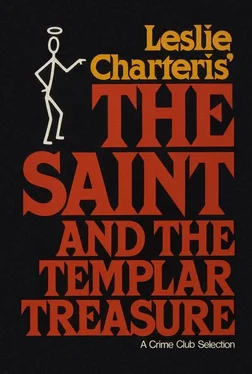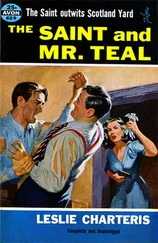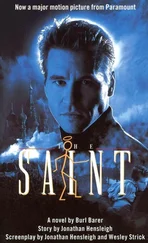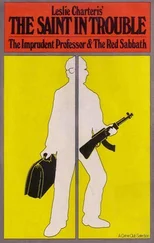“And you are not going to be able to do it if half a ton of rock lands on your head. You can come back when it’s been shored up.”
The authority in the Saint’s voice brooked no argument, and with a last longing look at the statue Norbert began to climb up the ladder. Simon stayed for one final review, and for the first time his gaze rested on the pile of stones that had once been the floor of the storehouse. What he saw made him bend down for a closer look.
He inspected one stone after another until he had examined all the larger fragments. About half of them were scored and chipped in a way that could never have been caused by their fall. It needed no Sherlock Holmes to deduce how the marks had been caused. Someone had recently been at work on the floor of the storehouse with a pickaxe.
That evening he dined alone with Yves Florian and Mimette. Philippe had phoned to say that he would not be home until late, Professor Norbert had pleaded that he wanted to be alone to study the historic implications of the underground chamber, and Henri Pichot and Jeanne Corday were having supper with Gaston at his cottage. As a result the tenseness that had marked the previous night’s meal was absent and the conversation less restricted. After ranging through a wide variety of topics from the state of the franc to the life expectancy of Generalissimo Franco, the talk reverted to the events of the afternoon.
“You must have very extensive cellars here where you store the wine,” said the Saint, when he had a suitable opening, and Yves nodded.
“To tell you the truth even I am not certain where they all begin and end, and I have lived here all my life,” Yves confessed. “My father had new storage facilities built under the courtyard by the chai, and it is there that we store most of the wine we produce. Except for the wine we keep for ourselves, which is kept under the kitchens, the old cellars are not used nowadays. Only Gaston, and perhaps Charles, would know all of them.”
“Yesterday on my way from my room to the salon I got lost and ended up at the chapel. I noticed a door at the foot of the stairs, and I assumed that was the main way in.”
“It used to be, but it has not been used for some years. Originally the staircase went right down to the old dungeons of the castle, but they became unsafe, and so we had to brick up the opening and put a door in. I don’t suppose anyone has been down there for ten years at least.”
Simon finished the last of his Château Ingare Reserve with unconcealed regret.
“A great wine,” he said. “You’re very generous to let me taste your private stock. I’m surprised the Germans allowed you to keep any of it.”
“We have Gaston and Charles to thank for that. They hid the finest vintages away, I don’t know where, and put old labels on all the newest and rawest, and the Boches sat around this very table and praised them to the heavens because he had told them they were so special. But then what can you expect from a nation of beer drinkers?” added Yves with chauvinistic glee.
The Saint wondered what the citizens of Rheinhessen would think of that, but decided not to make the point.
“I suppose Norbert has been pestering Gaston to death about all these closed-off crypts and passages,” he said.
“I have no doubt,” said Yves goodhumouredly. “He is doing no harm, and if he discovers anything of archaeological importance it will be interesting. And Philippe thinks it would do the business no harm to enhance our snobisme ancestral.”
“Not to mention my own,” said the Saint lightly.
Mimette put in: “If you would like to look at our private cellars, you would be most welcome. Just see Charles, there is nothing he enjoys more than showing off his private catacombs.”
The Saint was quick to accept.
“Thank you, I should like that very much indeed.”
The next morning after breakfast he took up the offer, and found the family retainer a willing and knowledgeable guide.
Charles ushered him down a winding flight of stone stairs that led off from a corner of a kitchen that looked big enough to prepare three-course meals for a regiment. He had the air of a curator opening the museum vaults to reveal his rarest and most precious collections. He seemed to blend in perfectly with the long racks of cobwebbed bottles and the close musty vinegar smell.
The cellar itself was unremarkable and from Simon’s viewpoint something of a disappointment. It consisted of a series of wide interconnecting tunnels that spread like the strands of a spider’s web from an open area in the centre, but all the ramifications were ultimately dead ends. The door from the kitchen provided both entrance and exit. At the end of most of the tunnels was a wall of new bricks built to separate the family’s personal wine stocks from the rest of the château’s cellars.
They walked slowly down the narrow aisles between the racks of bottles. Charles eagerly provided a running commentary on the different wines in his charge and enjoyed answering the Saint’s questions in the minutest detail. By the time the tour was completed the Saint’s repertoire of wine lore had been substantially increased; while Charles, finding his audience less inept than he had expected, became less formally distant and more congenial.
“You have been at Ingare for a long time?” Simon asked as they returned to the daylight.
“I have always been at Ingare,” answered Charles. “My father was butler before me, and his father before him. It is so long ago I am not even sure when we first came here.”
As he carefully double-locked the door to the cellar, Simon asked: “What do you think about this treasure of the Templars that everyone is so worked up about?”
“It is not my business,” Charles replied stiffly. “If there is one, it would belong to the Florians.”
He led the way back into the kitchen and it seemed to the Saint that the further they moved into the house the more Charles became the inscrutable servant and less the wine enthusiast chatting to a fellow connoisseur.
“Perhaps the chamber Gaston fell into yesterday might provide a clue,” Simon ventured. “I should think there are a number of underground passages here that no one knows about.”
“It is very possible, monsieur,” Charles agreed politely. “Is there anything else you require?”
There was; but not the kind of domestic service that Charles was offering. The Saint knew when he was being stonewalled and accepted that any further probing would be useless.
That afternoon he visited Gaston. The foreman’s home was a white-walled low-roofed cottage at the foot of the hill looking towards the Ouvèze, which he had learnt was the name of the river in the plain below. The ground floor consisted of a single room simply furnished with locally made furniture. A massive iron stove set into the fireplace served both for heating and for cooking food. The only decorations were an array of shining copper utensils that hung beside the chimney breast and an assortment of framed photographs on the mantelpiece. Despite its spartan appearance, however, the house had a feeling of warmth and security that the château could never project.
Gaston’s bed had been brought downstairs and he was sitting propped up in it reading when the Saint arrived.
“I am embarrassed, m’sieur,” he said. “I have no wounds, but the doctor orders that I must rest for two or three days until the pain in my back is gone.”
The overseer put away his book and the jumble of papers on which he had been scribbling, and for more than an hour they chatted about the harvest weather, about wine-making, about everything and anything but nothing in particular. The only awkward break in the conversation came when Simon brought up the mysterious underground chamber which Gaston had so dramatically and painfully opened up. It was a subject that Gaston gave the impression it would be disloyal or indiscreet of him to discuss.
Читать дальше












